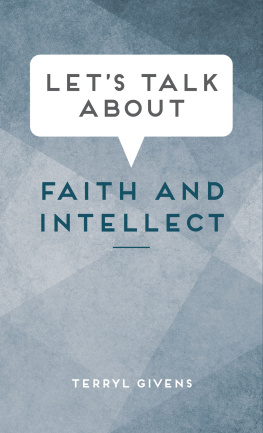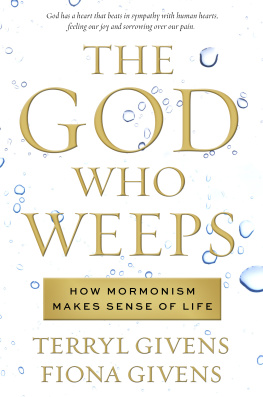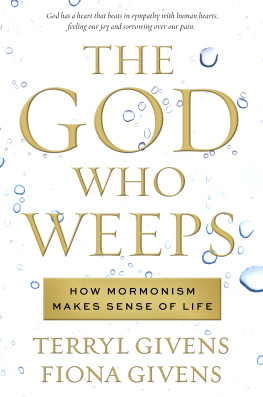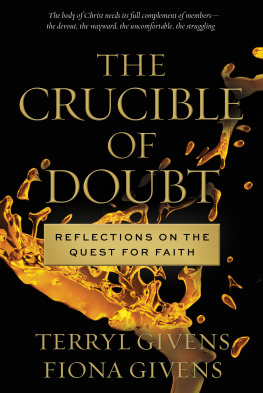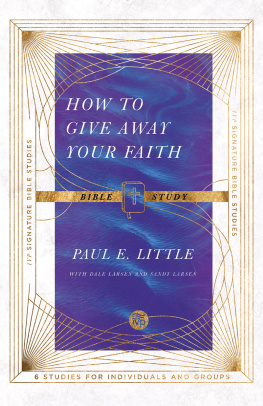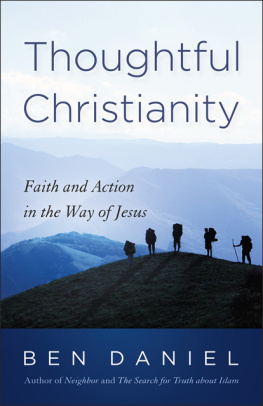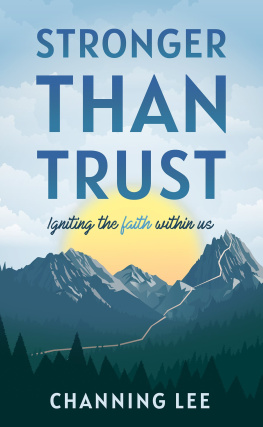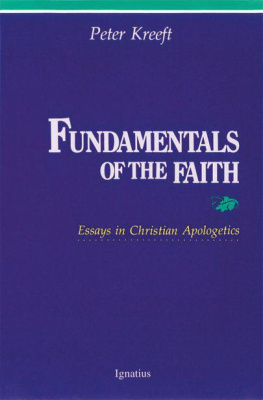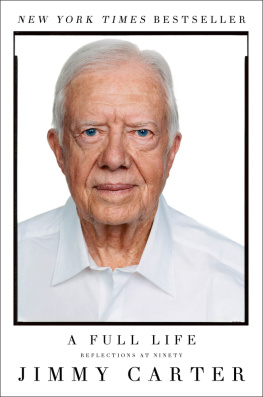Other Books in the
Lets Talk About Series
Lets Talk about Polygamy
Lets Talk about Religion and Mental Health
Lets Talk about the Book of Abraham
Lets Talk about the Law of Consecration
Lets Talk about the Translation of the Book of Mormon (coming early 2023)
For more information on the other books
in the Lets Talk About series,
visit DesBook.com/LetsTalk.
Book design Deseret Book Company
Cover image Apostrophe / shutterstock.com
Back flap photo provided by the author
Art direction: Richard Erickson
Design: Emily Remington and Shauna Gibby
All images are in the public domain, unless noted otherwise.
2022 Terryl L. Givens
All rights reserved. No part of this book may be reproduced in any form or by any means without permission in writing from the publisher, Deseret Book Company, at permissions@deseretbook.com. This work is not an official publication of The Church of Jesus Christ of Latter-day Saints. The views expressed herein are the responsibility of the author and do not necessarily represent the position of the Church or of Deseret Book Company.
Deseret Book is a registered trademark of Deseret Book Company.
Visit us at deseretbook.com
Library of Congress Cataloging-in-Publication Data
(CIP data on file)
ISBN 978-1-63993-041-8 | eISBN 978-1-64933-165-6 (eBook)
Printed in the United States of America
PubLitho, Draper, UT
10 9 8 7 6 5 4 3 2 1
To the fellowship:
Ryan, Dan, Morgan, George, Thomas, Fred, Steve, Bill, and Phil.
Models all.
Contents
Introduction
Faith and the quest for knowledge are not inconsistent; they are compatible and complementary.
Elder Quentin L. Cook
It has been said that when it comes to the news media, you have two choices. You can ignore it and be uninformed. Or you can pay attention and be misinformed.
In American culture, at any rate, the persistence of faith is not limited to isolated enclaves of the undereducated. Over the last century, more than 60 percent of Nobel laureates have been Christian.
What about Latter-day Saints in particular? Can any generalizations be drawn about intellect and faith, or education and religious observance in the Church of Jesus Christ? At the turn of the present century, one important study revealed that members of the Churchin the United States, where the social science data are availableare an exception to the widely held secularization hypothesis (the view that links secularizationand its emphasis on scientific, rational thoughtwith a decline in religion). This study found, contrary to the general pattern, that for Latter-day Saint men and women, the higher the level of education, the higher ones level of religious observance.
Clearly, educated, thoughtful, reasonable people can and do find a comfortable synthesis between the life of the mind and the life of faith. Equally obvious is the fact that many people are not finding the two compatible. Many intellectual challenges to faith have existed from the earliest days of the Christian traditionand they will always continue. Christianity was predicated on the seemingly absurd claim that a man crucified and then buried in a tomb for three days rose from the dead and ascended to heaven. That story took hold and flourished in a Roman society that had inherited the richest philosophical traditions in the Western world. Even the Apostles themselves were initially incredulous of the Resurrection, dismissing the report of Mary out of hand: Now when Jesus was arisen early the first day of the week, he appeared first to Mary Magdalene, out of whom he had cast seven devils. And she went and told them that had been with him, as they mourned and wept. And they, when they had heard that he was alive, and had been seen of her, believed not (Mark 16:911). Then, as now, believers had to contend with common sense, lived experience, the tragedy and finality of death, and the demands of reason. Then, as now, one did not find a durable faith by ignoring those demands, but by acknowledging that in all of lifes most important transactions and commitments and decisions, we rely upon a broad array of resources to find our way through the darkness.
Reason has its strengths. So do experience, conscience, intuition, emotion, and other inner faculties that may have other names or no name. All these resources may constitute the basis of a faith that is solidly rooted on evidence that is real... because it is discernible (Alma 32:35). That is my thesis in this book. My twin emphases will be on those ways in which reason and intellect sustain belief in those propositions held by believing members of The Church of Jesus Christ of Latter-day Saints, and on those moments or areas where the historical and personal resources of intellect are not adequate to fully address matters of deepest import. In other words, faith is sustained by intellect, and where intellect falls short, additional resources available to us provide a valid basis for commitment to Christ and His gospel.
This is not to say that our brains get us only so far along the road to understanding and wisdom, at which point we must stop short before the unsearchability of the deepest truths and simply succumb to the mystery. Faith is not just a hopeful leap into the dark, wishful thinking against the grain of the evidence. The thoughtful, reflective faith of which I will be writing considers the findings of science, the lessons of history, the insights of philosophy, and the best reasonings of our intellect. And it adds to those an openness to other faculties, a receptivity to the intimations of the heart, confidence in the moral intuitions of the soul, and forms of trusting and knowing for which we may not even have language.
We may be embodied brains, supersophisticated computing systems in an environment of pulsing flesh. And we are doubtless biological organisms, with a history of competition in the trial of life, struggling for survival and reproducibility. However, there is more to be said on the subject of human identity. We are complex beings, and our nature is not reducible to a few drives and appetites. The psychologist Abraham Maslow changed the field of modern psychology when he went beyond simplistic Darwinian models of human motivation to place, at the top of his hierarchy of human needs, self-actualization. Jonathan Haidt extends this key to human nature by invoking what he identifies as a universal human impulse to find the staircase amid all the clutter. In his experience as a teacher and social scientist, people are all searching for the staircase, bearing witness to the human drive and the capacity for self-transcendence. Yes, we crave food and drink. We want physical comforts and respond to sexual motivations. As biological beings, our bodily needs demand our attention and satisfaction. Maslows breakthrough question (like that of Haidt) was the implied, And then? That is the question with undeniable resonanceone that reason and faith combine most compellingly to answer.
Maslows conception behind the principle of self-actualization moves us in the direction of what is most distinctly human. He writes, Even if all these [primary, basic] needs are satisfied,... a new discontent and restlessness will soon develop, unless the individual is doing what he is fitted for. A musician must make music, an artist must paint, a poet must write, if he is to be ultimately happy. What a man can be, he must be. This need we may call self-actualization.

